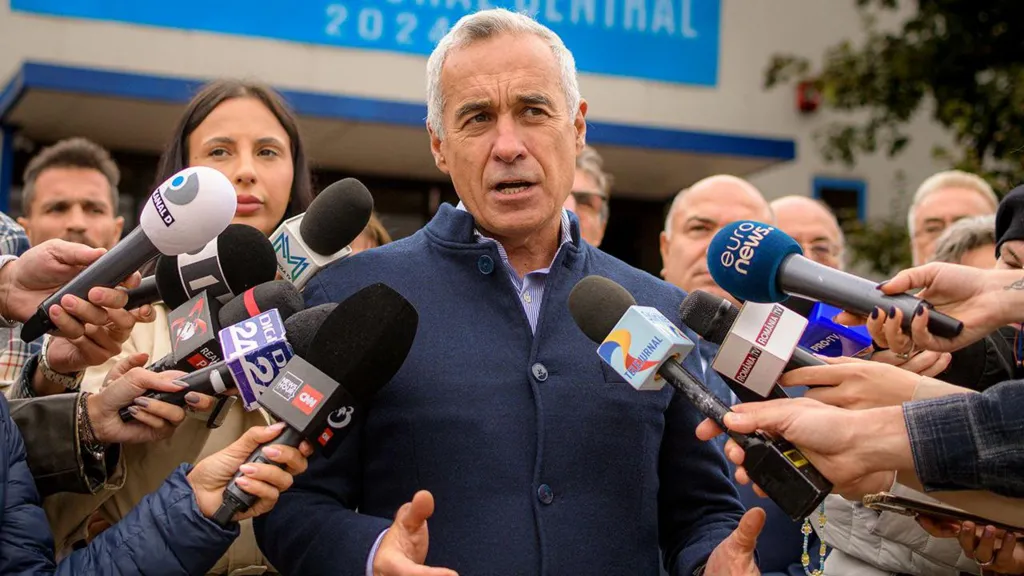Far-right candidate takes shock lead in Romania presidential election
3 min read
Calin Georgescu, running as an independent candidate for president, speaks to media after registering his bid in the country's presidential elections, in Bucharest, Romania, Tuesday, October 1, 2024. © Alexandre Dobre, AP
A surprise shift in Romania’s presidential race has placed far-right, pro-Russia candidate Calin Georgescu in a shock lead after the first round of voting. With more than 99% of the vote counted, Georgescu, an ultranationalist with no political party affiliation, secured 23% of the vote. He was followed by Elena Lasconi, the centre-right candidate from the Save Romania Union, and populist social democrat Marcel Ciolacu, the pre-election favorite. The result marks a significant upset in what had been considered a relatively predictable race, with Georgescu’s strong showing catching many by surprise.
Elena Lasconi is currently ahead of Ciolacu by a narrow margin of around 2,000 votes and is set to face Georgescu in a final run-off scheduled for December 8. Following the results, Ciolacu tendered his resignation as leader of the Social Democrats, acknowledging his loss. Political analyst Radu Magdin described Georgescu’s unexpected performance as unprecedented, noting that pre-election surveys had placed him at only 5%. “Never in our 34 years of democracy have we seen such a surge compared to surveys,” said Magdin, underscoring the candidate’s surprising rise.
Georgescu’s campaign was primarily fueled by his presence on social media, notably TikTok, where he gained significant attention. His message, centered around national pride and anti-Western rhetoric, resonated with a segment of the electorate disillusioned by Romania’s current political landscape. His slogan, “Restore the dignity of the Romanian nation,” gained traction, especially among voters frustrated by the status quo. Georgescu’s rhetoric has attracted significant interest from Russian media, and his political views align closely with pro-Russian sentiment. He has criticized Romania’s NATO membership, particularly opposing the NATO ballistic missile defense system stationed at the Deveselu base in southern Romania, calling it “a disgrace.”
Once a member of the far-right Alliance for the Union of Romanians (AUR), Georgescu was expelled for his radical views, including praise for leaders of the Iron Guard, a fascist movement that operated in Romania during World War II. However, following Sunday’s first round of voting, AUR leader George Simion endorsed Georgescu, urging his party’s 1.3 million voters to back Georgescu in the run-off election.
The rise of Georgescu presents a challenge for many Romanians, especially those who supported other candidates in the first round. Should Lasconi advance to the second round, it may be difficult for many Social Democrat supporters, particularly those in rural areas, to back her given her liberal and progressive platform. This division highlights the polarizing nature of Romania’s current political climate, with a large portion of the population feeling alienated by both the mainstream parties and the current political elite.
Campaign discussions leading up to the election centered largely on issues of economic hardship, including the skyrocketing cost of living in Romania, which has the highest proportion of people at risk of poverty in the European Union. The issue of Romanian support for Ukrainian refugees also played a significant role in voter sentiments, with some expressing resentment over the perceived financial burden posed by the influx of refugees.
While the president of Romania holds a largely symbolic role, they do wield significant influence in matters such as foreign policy. This underscores the importance of the final round of voting, as the next president will shape Romania’s position on international issues, including its relationship with both NATO and Russia. The unexpected surge in support for Georgescu has raised questions about Romania’s future direction, particularly regarding its geopolitical alignments.
Voter turnout for the first round was 51%, roughly in line with the figure from the last presidential election five years ago. With the second round looming, the battle for the presidency now hinges on the ability of the candidates to sway voters, especially those who supported losing candidates in the first round. Georgescu’s momentum has upended expectations, and his rise signals potential shifts in Romania’s political landscape as the country faces economic challenges and increasing polarization.





